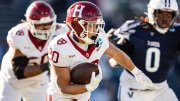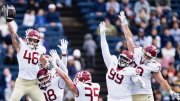Click-boom-sssshhh. Click-boom-sssshhh--amid the accolades and hardships of academic life, nothing else has so defined my Harvard experience as the desire to cultivate that sound. Click--eight oars drop into the water. Boom--eight oarlocks snap after eight solid leg drives. Sssshhh--the shell hums across the water as eight rowers move up their slides to prepare for the next stroke.
Some form of this rhythm is present during every stroke taken by a decent crew. But only rarely--perhaps a handful of practices a year for even great boats--is it achieved with such timing and precision that the noises suggest a pulse, or heartbeat. At these sublime moments, nine dedicated athletes--each a unique, self-directed scholar off the water--successfully meld into a driving organic machine, a nautical engine vastly more powerful than the sum of its parts.
I can think of few more satisfying experiences I've had at Harvard than these moments when eight oarsmen's movements become so indistinguishable that the shell comes to life. Indeed, at Harvard, where so often we spend our days and nights striving alone (and lonely), crew is a powerful palliative to the mental seclusion of our studies. Through focus, training, and shared commitment, nine individuals achieve as one. Indeed, the best oarsmen are those who end up performing the most alike.
As with Eastern philosophy, martial arts, and a University that vaunts its love of veritas with a statue harboring three lies, rowing is rife with intriguing paradoxes. More than an ancient form of capital punishment, more than an antique pastime for bygone elites, more even than a strenuous undergraduate sport, rowing is a mental discipline whose paradoxes illuminate.
The first of these to confront me was the position of the coxswain itself. Like most people, my definition of coxswain before I joined the team was "the little guy who yells 'Stroke.'" A soccer player in high school, I fell into coxing six weeks into my first year only because I wasn't good enough for Harvard's fútbol team. At the time, two of my freshman roommates desired to row but instead, being short, were being solicited every day to cox. At their behest, I walked over to Newell Boathouse and voiced my curiosity to freshman coach Blocker Meitzen. Within minutes I found myself lodged in the stern of a shell, gaping cluelessly at eight expectant rowers. Initial nerves aside, after I received a crash course in steering and got used to the ever-present microphone, the practice proceeded without incident. I'm on the team, I get to pilot the ship, and I DON'T HAVE TO PULL, I remember thinking as I docked that first day. What a racket! This should be fun and easy.
How little I knew. Fun, yes--easy, no. The coxswain's responsibilities include steering a straight course, coaching technique on the water, acting as motivator for the crew, and coordinating race strategy. I soon discovered that balancing these tasks with aplomb is no row in the park. (As acute a mind as Stephen Hawking's struggled with this endeavor in his years at Cambridge.) Frankly, I spent several of my earlier races caught up in the moment, barking orders incoherently while veering into nearby launches. A port oarsman on my sophomore boat, Matt Holian '95, put it to me very succinctly after one of these ordeals. "While we pull through the pain," he said, "you have to think through the pain."
As the months passed and my skills progressed, I discovered what he meant. While each morning I explored an array of intriguing subjects in my classes, each afternoon I returned to honing the same intellectual task: improving the speed of our vessel through the cadences, rhythm, and tone of my voice and the conviction and clarity of my language. Week in and week out, in class, at dinner, or in bed, I would contemplate the day's practice and wrestle with the dualisms of crew: recovery and drive, relaxation and power, nine and one, body and mind, victor and vanquished. There were times, particularly in the intensive spring racing seasons, when my waking moments were consumed with thoughts of tomorrow's calls, while my dreams filled with power tens, phantom craft, and monstrous buoys lurking off the starboard bow. Though it had seemed at first that coxing would be a relatively no-stress position, I learned from the tao of crew an important lesson--that true mental focus can be as strenuous, demanding, and ultimately as powerful as physical exertion.
That being said, it is important not to overstate the case. Whatever the travails of the coxswain, they are no match for those of the rowers, who must maintain both mental discipline and physical endurance in the face of crushing fatigue in order to win the day. "It's the most encompassing sport there is," says William Evans '98, two-seat of the Harvard varsity lightweight boat (HVL). "Your mind, your body, and the equipment you use have to unify for a constant effort."
Due to the unearthly intensity required of such men and women, the fellowship of rowers runs deep. "The amount of time, focus, and determination everyone puts in for crew creates a much tighter bond than for any other extracurricular I'm aware of," remarks Jonathan Lankin '98, of the junior varsity heavyweight crew. "It's kind of crazy," concurs Jonathan Kibera '98, three-seat of HVL. "My tightest friends are all on the team--you get to know your teammates in ways unlike any other. Sharing someone's pain is a much more profound way of meeting than hanging out at a party."
From this shared striving between oarsmen, winning boats are molded. "Rowing is the ultimate team sport," says Edward Shergalis '97, two-time national champion and HVL stroke. "The Chicago Bulls have some outstanding players, but their team has fundamental weak links. In crew, everyone has to give 100 percent, from the coach to the coxswain to every oarsman. In order to win, everyone has to keep the intensity, and everyone has to mesh." David Hirsch '97, seven-seat of HVL, agrees. "Boats are basically codependent," he muses. "You can't say, 'I don't want to concentrate today,' or 'I don't want to practice hard,' or else the whole boat suffers."
Yet despite the work to create a strong, fast, and focused unit, rowing in its own way remains very much a solo endeavor. "For nine out of the 10 months of the season," remarks Evans, "individual oarsmen have to push themselves. Guys come down here mornings and evenings all year to improve their individual ergs. The team dimension of the sport doesn't manifest itself until very late in the game." As two-time national champion and HVL bowman Ryan Wise '97 notes, "Crew is mostly a strange individualism. We gather into boats for only two months out of the year, and for the rest of the time it's all about individual striving. Oddly enough, there's no opportunity to express this striving unless there are eight other people around."
Another intriguing nuance of the sport is the ratio of practice to race time. "A season consists of 1,000 hours of training for 36 minutes of racing," Kibera remarks. "You really can't afford to screw up." And therein lies another riddle of the tao. "After we lost to Yale at the end of last year," recalls varsity heavyweight oarsman David Ellis '98, "we were absolutely spent physically, mentally, and emotionally. [Then captain] Alex Blake told us, 'It starts today.' And it did. It took a whole year of dedication and intensity to come back, but we did it. Our victory against Yale this year didn't take place in the 20 minutes of the race--it took place over the course of 10 months of work."
Shergalis finds this paradox to be the most meaningful he has taken from the sport. "If you work hard and commit yourself to the goals that you set forth--in short, if you put in the preparation beforehand--success is almost inevitable. That's a lesson I will carry through many other aspects of my life in the future."
Tellingly, Shergalis's individual enthusiasm strengthened other members of the team. "Historically, freshman year is when every Harvard oarsman is most likely to quit," says Kibera. "Chris Sims ['98, HVL six-seat] and I got on the bus after losing badly, and Shergalis, who had just won Sprints with the varsity boat, told us, 'Stick around, you'll get your chance on the dock.' A year later, I found out he was right, and now I find myself saying the same thing to the freshmen."
Although I learned many important truths in my classes at Harvard, it is this veritas of community and common endeavor, so elusive in our academic lives yet so central to crew, that I take most to heart. "More than anything else, crew is a mindset," remarks David Ellis. "It's not something you're aware of only when you're doing it. It's something you carry through with you every day. The fact is, when you're in any community of people, it takes a lot of individual efforts from uniquely driven people for anything to work. Yet you can't be totally focused on yourself--you have to be sensitive to and appreciative of others. That goes for your boat, your dorm, and any other people around you."








